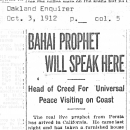Main menu
- ‘Abdu’l-Bahá’s Journey
- World Peace
- Stopping Racism in America
- Empowerment of Women
- More Principles...
- Prayer for America
Bahá’í Prophet Will Speak Here
Head of Creed For Universal Peace Visiting on Coast
The real live prophet from Persia has arrived in California. He came last night and has taken a furnished house of his own, where he will live for several weeks and receive his friends and followers. He is Abbas Essendi, the visible head of the Bahá’í Movement, which numbers several millions or followers among all the principal religions of the world. Abbas Essendi is sometimes known as ‘Abdu’l-Bahá’í, or “The Servant of God,” and the gospel which he is preaching is the gospel of universal peace and brotherhood. “To be a Bahá’í,” he says, “means to love all the world; to love humanity and to try to serve it; to work for universal peace and universal brotherhood.” This surely is an ideal that any modern man might well espouse.
Abbas Essendi is to lecture in the First Congregational church, Oakland, on the subject of Universal Brotherhood, next Sunday evening. He appears in a black robe with a white turban, and is said to be a most impressive figure. He has preached in the City Temple, London, and in many of the most important churches of the United States on his way to the Pacific coast.
His life has been filled with persecution and hardship. The movement with which he is connected began some 70 years ago, and its founder, the Báb, suffered martyrdom for his faith. The father of ‘Abdu’l-Bahá’í succeeded to the head of the religion, and before long was arrested by the Turkish government and was in great danger of losing his life. Some of the powerful nations interfered, however, and so he was condemned to perpetual exile in the city of Acre, Palestine. Here he died some 10 years ago. His son, Abbas Essendi, inherited his sentence of perpetual exile. He was allowed to receive visitors, and through them has enlisted a large number in all parts of the world. He, perhaps, would have perished in prison, as his father did, if it were not for the Turkish revolution.
His doctrine is not antagonistic to Christianity. It is a serious philosophy, and has enlisted many of the thoughtful people of all religions and of all races.



.png)





